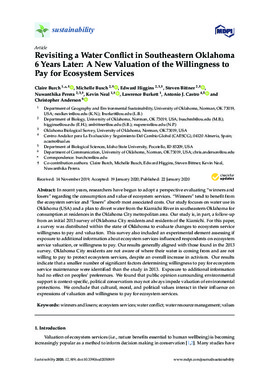| dc.contributor.author | Burch, Claire | |
| dc.contributor.author | Busch, Michelle | |
| dc.contributor.author | Higgins, Edward | |
| dc.contributor.author | Bittner, Steven | |
| dc.contributor.author | Perera, Nuwanthika | |
| dc.contributor.author | Neal, Kevin | |
| dc.contributor.author | Burkett, Lawrence | |
| dc.contributor.author | Castro, Antonio J. | |
| dc.contributor.author | Anderson, Christopher | |
| dc.date.accessioned | 2020-02-13T17:41:31Z | |
| dc.date.available | 2020-02-13T17:41:31Z | |
| dc.date.issued | 2020-01-22 | |
| dc.identifier.citation | Burch, C.; Busch, M.; Higgins, E.; Bittner, S.; Perera, N.; Neal, K.; Burkett, L.; Castro, A.J.; Anderson, C. 2020. Revisiting a Water Conflict in Southeastern Oklahoma 6 Years Later: A New Valuation of the Willingness to Pay for Ecosystem Services. Sustainability 12 (3): 819. | en_US |
| dc.identifier.uri | https://hdl.handle.net/11244/323465 | |
| dc.description.abstract | In recent years, researchers have begun to adopt a perspective evaluating “winners and losers” regarding the consumption and value of ecosystem services. “Winners” tend to benefit from the ecosystem service and “losers” absorb most associated costs. Our study focuses on water use in Oklahoma (USA) and a plan to divert water from the Kiamichi River in southeastern Oklahoma for consumption at residences in the Oklahoma City metropolitan area. Our study is, in part, a follow-up from an initial 2013 survey of Oklahoma City residents and residents of the Kiamichi. For this paper, a survey was distributed within the state of Oklahoma to evaluate changes to ecosystem service willingness to pay and valuation. This survey also included an experimental element assessing if exposure to additional information about ecosystem services influenced respondents on ecosystem service valuation, or willingness to pay. Our results generally aligned with those found in the 2013 survey. Oklahoma City residents are not aware of where their water is coming from and are not willing to pay to protect ecosystem services, despite an overall increase in activism. Our results indicate that a smaller number of significant factors determining willingness to pay for ecosystem service maintenance were identified than the study in 2013. Exposure to additional information had no effect on peoples’ preferences. We found that public opinion surrounding environmental support is context-specific, political conservatism may not always impede valuation of environmental protections. We conclude that cultural, moral, and political values interact in their influence on expressions of valuation and willingness to pay for ecosystem services. | en_US |
| dc.description.sponsorship | This manuscript was supported by funding from the US National Science Foundation (NSF DGE-1545261).
Open Access fees paid for in whole or in part by the University of Oklahoma Libraries. | en_US |
| dc.language | en_US | en_US |
| dc.rights | Attribution 4.0 International | * |
| dc.rights.uri | https://creativecommons.org/licenses/by/4.0/ | * |
| dc.subject | winners and losers | en_US |
| dc.subject | ecosystem services | en_US |
| dc.subject | water conflict | en_US |
| dc.subject | water resource management | en_US |
| dc.subject | values | en_US |
| dc.title | Revisiting a Water Conflict in Southeastern Oklahoma 6 Years Later: A New Valuation of the Willingness to Pay for Ecosystem Services | en_US |
| dc.type | Article | en_US |
| dc.description.peerreview | Yes | en_US |
| dc.identifier.doi | 10.3390/su12030819 | en_US |
| ou.group | College of Atmospheric and Geographic Sciences::Department of Geography and Environmental Sustainability | en_US |

